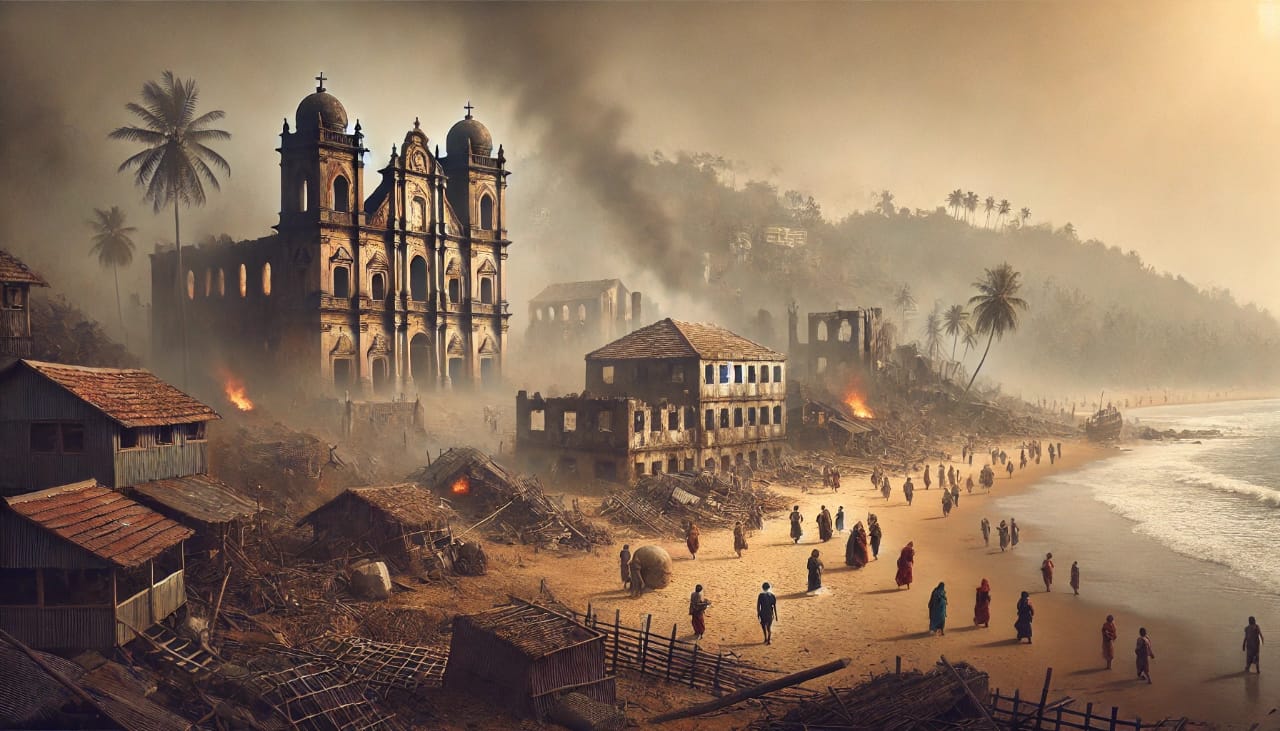The comparison between Goa’s peaceful transition and Gaza’s ongoing turmoil highlights the consequences of colonial withdrawal strategies

As the world commemorates the anniversary of Auschwitz's liberation, the plight of displaced populations remains a pressing concern. Goa, a former Portuguese colony, provides a compelling case study when compared to Gaza, where Israeli policies have left the region in a state of perpetual suffering.
Had the departing Portuguese administration in 1961 implemented a scorched earth policy, Goa might have found itself in a situation eerily similar to present-day Gaza — economically devastated, socially fragmented, and politically unstable. This hypothetical scenario highlights the intersection of colonial legacies, forced displacement, and the ironies of history.
Historical context
of Goa’s liberation (subhead)
Under Portuguese rule for over 450 years, Goa experienced significant economic and cultural transformations. The colonial administration, driven by economic interests and religious zeal, fostered a unique Indo-Portuguese identity. However, resistance to colonial rule persisted, culminating in Operation Vijay in 1961, when the Indian military annexed Goa.
Unlike other decolonisation efforts, the transition was relatively peaceful, allowing Goa to integrate into India without significant destruction to infrastructure or displacement of its people (Bose, 2019).
Had the Portuguese implemented a scorched earth policy, the region’s trajectory would have been drastically altered.
The destruction of vital infrastructure, agricultural lands, and homes might have forced Goans to seek refuge along the coast, mirroring the conditions faced by Palestinians after Israel's withdrawal from Gaza in 2005. Economic opportunities would have been scarce, and cultural heritage severely eroded, leaving Goa reliant on external aid and struggling to rebuild.
The paradigm shift: Goa
without infrastructure
If Goa had faced widespread destruction before liberation, the region would have undergone profound social and economic disruptions. Essential services such as healthcare, education, and public utilities would have been eliminated, forcing Goans into mass displacement and creating refugee-like enclaves along the coastline.
Similar to Gaza's blockade, restricted access to resources could have rendered Goa dependent on external support (Rodrigues, 2020).
The tourism-driven economy that now sustains Goa might have never materialised under such conditions. The destruction of historical sites and cultural landmarks would have deprived the region of valuable economic assets.
Social cohesion might have been replaced by sectarian tensions and competition for scarce resources, deepening fault lines within the community.
Plight of Palestinians
and historical irony
The predicament of the Palestinian people in Gaza draws unsettling parallels to what Goa could have experienced under a scorched earth policy. Since Israel’s withdrawal, Gaza has faced blockades, economic deprivation, and periodic military offensives, leaving it in a state of perpetual crisis.
Deliberate targeting of infrastructure and restrictions on essential goods have created an environment where survival is a daily struggle (Pappé, 2015).
It is a tragic irony that Israel, a state born from the ashes of the Holocaust, has adopted policies reminiscent of those imposed upon Jews during World War II. The Auschwitz anniversary serves as a sobering reminder of the suffering inflicted by Nazi Germany, yet Israel’s treatment of Palestinians reflects a troubling cycle of oppression.
The displacement, systemic discrimination, and economic suffocation of Palestinians evoke memories of the very persecution that the Jewish people once endured. The transformation of the oppressed into oppressors presents a paradox that continues to unfold in contemporary geopolitical discourse.
Lessons for Goa and
broader global context
While Goa was fortunate to avoid such a fate, examining the hypothetical destruction of its infrastructure offers valuable lessons. The preservation of economic potential and cultural identity is crucial for post-colonial societies to thrive.
The importance of responsible governance and international oversight in preventing humanitarian crises cannot be overstated. Gaza's situation serves as a cautionary tale of what can happen when decolonisation is marred by destruction and neglect.
The ongoing debate over special status for Goa suggests that, even without physical devastation, the fear of cultural erosion and economic exploitation persists. Concerns over migration, rapid urbanisation, and environmental degradation fuel calls for protections to preserve Goa’s unique identity.
Though not comparable to Gaza’s existential struggles, these anxieties highlight universal challenges faced by regions in balancing modernisation with cultural preservation.
The hypothetical implementation of a scorched earth policy in Goa would have drastically altered its post-colonial trajectory, leaving it in a state akin to present-day Gaza.
The destruction of infrastructure and forced displacement could have rendered Goans refugees in their own land, dependent on external aid and struggling to reclaim their identity. The comparison between Goa’s peaceful transition and Gaza’s ongoing turmoil highlights the consequences of colonial withdrawal strategies and the critical need for responsible governance.
As the world reflects on Auschwitz, the irony of historical cycles of oppression and displacement remains apparent. The plight of the Palestinian people under Israeli policies highlights the importance of learning from history to prevent future humanitarian disasters.
The case of Goa demonstrates that peaceful transitions are possible when post-colonial regions are allowed to preserve their culture and rebuild their economies without interference.